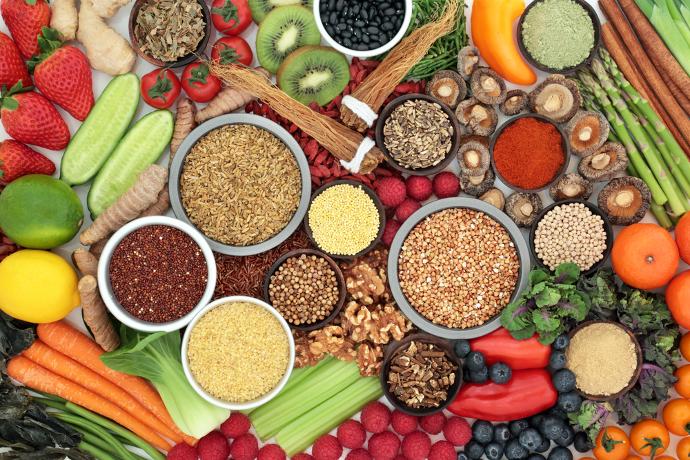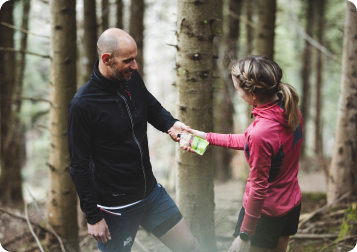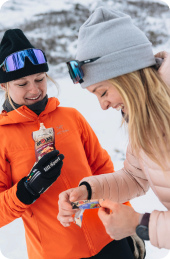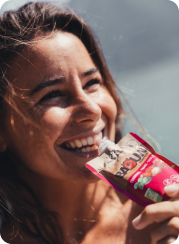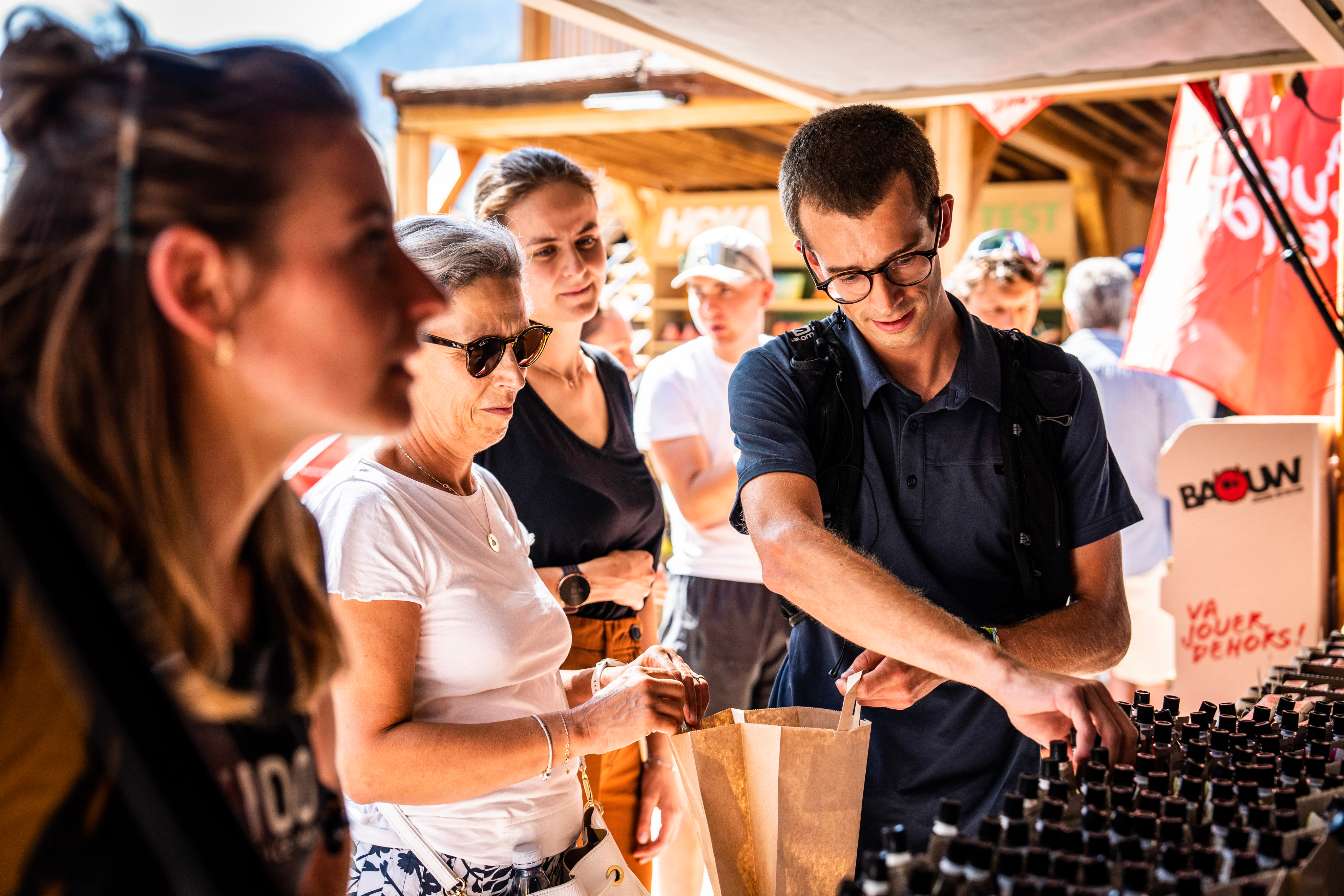In this article, we invite you to find out what antioxidants really are, why they are so important for you as a sportsperson, what can happen if you run out, and where you can find them to boost your performance.
But what exactly are antioxidants?
We often hear about antioxidants in the context of preserving beautiful skin despite the years. But that's oversimplifying things! Antioxidants work against cell ageing. In concrete terms, they are molecules capable of neutralising free radicals, unstable compounds produced during normal metabolic reactions in the body. They are also generated by external factors such as pollution, smoking... or intense physical exercise. Free radicals are atoms or molecules that have lost one or more electrons, making them highly reactive and capable of damaging cells, proteins and DNA.
Antioxidants work by giving free radicals an electron, which stabilises them and prevents cell damage. As an athlete, it would be a shame to go without, wouldn't it?
The different forms of these superheroes
Of course, these super-powered molecules come in many forms (otherwise, it would be too simple!). More specifically, the best-known antioxidants found in food essentially fall into the following categories:
- beta-carotene, or provitamin A: as well as carrots, it's found in brightly-coloured fruit and vegetables with red and orange tones. Go for pumpkin and other squashes, sweet potatoes, apricots, etc!
- Ascorbic acid, or vitamin C: you can find good quantities in oranges and blackcurrants, but also in parsley, horseradish, red peppers and kale. It's a great way to vary your culinary pleasures ;)
- Tocopherol, or vitamin E: this is basically ‘good fat’, like that found in olive oil, wheat germ oil, sunflower oil or hazelnut oil.
- Polyphenols and lycopene: polyphenols are found in tea, cocoa, coffee, red berries and a wide range of plants. Tomatoes are bursting with lycopene. Cooked at a low temperature and combined with quality olive oil such as that produced by Chris & Olive, it is a bomb of antioxidants particularly suited to sportsmen and women. As our Baouw nutritionist Benoît Nave likes to point out, ‘what makes olive oil special, especially when it's organic and first cold-pressed, is its antioxidant content’.
This list is not exhaustive, but is intended to give you an overview of the different categories of antioxidants so that you can ensure your intake as a sportsperson. There are other types: certain trace elements, for example, have interesting antioxidant properties, such as selenium, zinc and copper. And the killer detail is that these minerals are needed in small quantities. There's no need to worry about stocking up on antioxidants, so you can concentrate on your sports sessions with complete peace of mind!
The importance of antioxidants for athletes
Oxidative stress occurs when the production of free radicals exceeds the body's ability to neutralise them. In sportsmen and women, intense physical activity increases oxygen consumption, leading to an increase in the production of free radicals. Excessive oxidative stress can lead to cell damage, chronic inflammation, increased fatigue and even injury.
Muscle recovery and injury prevention during sports training
Antioxidants play a major role in post-training muscle recovery. After physical effort, muscles undergo micro-injuries that require rapid repair to prevent injury on the one hand, and improve performance on the other. These molecules help to reduce inflammation and speed up recovery by limiting the damage caused by free radicals.
Antioxidants and improved sports performance
By reducing muscle fatigue, antioxidants play their part in optimising sporting performance. One example is vitamin C, known for its role in the production of collagen, which is important for the health of tendons and ligaments. Vitamin E protects cell membranes against oxidation. In concrete terms, during exercise, the combination of good management of your is a match made in heaven for your sporting results.
The best sources of antioxidants for athletes
Fortunately, there are many natural sources of antioxidants that can help athletes maintain optimal balance. Let's expand a little on the examples given above to help you easily turn to foods that are full of antioxidants!
Fruit and vegetables to fight free radicals
As you've already guessed, fruit and vegetables are among the best sources of natural antioxidants. Red fruit, whether strawberries, blueberries, cherries, plums or raspberries, are particularly rich in polyphenols, so they're well worth including in your sports menu. Of course, citrus fruits also help you fight free radicals thanks to their high vitamin C content. Ideally, choose them organically, and keep the peel to season your salads and desserts.
In addition to brightly-coloured vegetables, green leafy vegetables such as spinach and kale are also excellent sources of the molecules we're interested in, as is broccoli, which is also rich in vitamins A and C.
Oilseeds, ideal for your sports sessions
Nuts and seeds, such as almonds, hazelnuts and sunflower seeds, are rich in vitamin E, a fat-soluble antioxidant that protects cell membranes. These foods are also a good source of selenium and zinc, two minerals essential for protection against oxidative stress.
Aromatic herbs and spices, an important complement
Antioxidants are also hidden in certain herbs and spices. At the top of the list is turmeric, which we recommend you consume in its rhizome form rather than in powder form (or only in very high quality). As well as adding a pleasant flavour to your dish and blending easily with a multitude of ingredients, it will give your athletic body all the benefits of curcumin, a very powerful antioxidant.
Cinnamon is rich in polyphenols, so don't go without it if you like the taste of this spice! Lastly, when it comes to aromatic herbs, oregano, thyme, basil, parsley and coriander are at the top of the podium.
What about antioxidant supplementation?
For some sportspeople, particularly those who train intensively, their needs may be greater than what their diet alone can provide. What's more, other top-level sports enthusiasts, for various reasons, have to ban certain types of food. At Baouw, we tend to encourage a tailored diet in such circumstances, for example a or But we are aware that in certain cases, antioxidant supplements may be considered. However, it is important to point out that supplementation must be carried out under the supervision of a health professional, as an excess of antioxidants can have counter-productive effects and impair sporting performance.
The right reflexes for sportsmen and women to boost the benefits of antioxidants
To get the most out of antioxidants, we encourage you to add them regularly to your menus, as part of a balanced diet. Antioxidants work synergistically, so it's best to consume them from a variety of sources, rather than focusing on just one type of nutrient. For example, you can:
- add herbs and sunflower seeds to your dishes,
- sprinkle your desserts with cocoa,
- alternate between coffee, green tea and black tea,
- sublimate your raw vegetable salads with a good olive oil
- nibble on a few macadamia nuts as a healthy snack
- opt for fromage frais with red berries
- indulge in a square of cocoa-rich dark chocolate.
Our teams are also thinking of athletes in a hurry looking foras illustrated by our express purée recipes. Got a little more time to cook? Make yourself a sweet potato purée with turmeric and coriander! The free radicals have it easy!
Y a-t-il un meilleur moment pour en consommer ?
For athletes, the timing of antioxidant consumption can also be an issue. As well as incorporating them into your daily diet, it's a good idea to consume them just after your workout, to help speed up muscle recovery and reduce inflammation. In addition to our grain-free cereal bars, are packed with antioxidant-rich ingredients. Practical, easy to consume and digest, they are specially designed to meet the needs of athletes. An alternative that's as healthy as it is delicious!
Balancing antioxidants and exercise
Now that you know almost everything there is to know about the relationship between antioxidants and performance, let's conclude this article with a final reminder. Don't forget that it's very important to maintain a balance between the intake of our superhero molecules and the intensity of exercise. Too high an intake of antioxidants, for example, is likely to interfere with certain beneficial physiological adaptations induced by exercise, such as the increased production of mitochondria, the cells' “energy powerhouses”.



